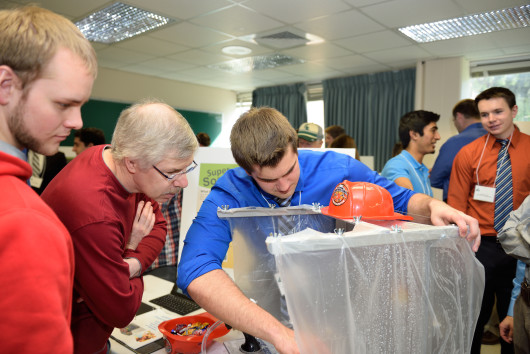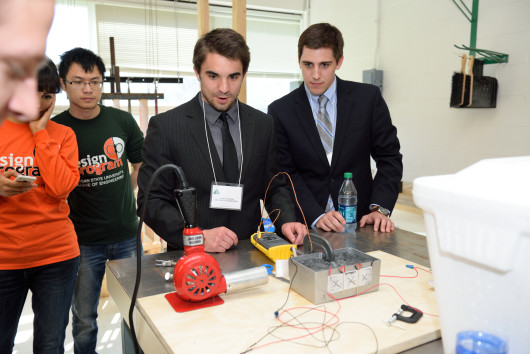Mechanical Engineering
Non-Capstone Projects
In addition to the ME 481 Senior Capstone class, there are four design courses required of all Mechanical Engineering majors. Three of those courses participate in Design Day. For the complete competition schedules, please see the Design Day Booklet.
In ME 371 Mechanical Design I students are required to design and manufacture mechanisms that incorporate at least one linkage, one gear set and one cam-follower combination.
These projects are on display during Design Day from 9:00 until noon in Gold Rooms A and B Second Floor. The team with the best design, as voted on by pre-collegiate visitors, is awarded the Sparty Plaque.
Students in ME 471 Mechanical Design II were challenged to design, build and test a small scale horizontal motion conveyor system to transport cereal during processing. The design scope includes (1) the drive mechanism, (2) the pan, (3) the supports and (4) all associated hardware. The system should be designed and manufactured so that:
- Energy usage and system cost are minimized. For the most part, these goals are accomplished simultaneously by minimizing the mass of the pan and ensuring smooth motion.
- Product flows rapidly along the length of the pan to maximize throughput.
- Product is distributed uniformly across the width of the pan (to enhance cooling, drying and distribution of the product).
- All metallic structural components are designed to have infinite fatigue life.
- The operation of the system is safe for all personnel and intended products.
- The system is easily maintained, including cleaning, aligning and general maintenance.
- The system is easily assembled and disassembled for use in different configurations and lengths.The total design performance determines 50% of the final grade, and the other 50% is determined by a final written report that details the concept development and selection process, kinematic analysis, finite element structural analysis, failure analysis, fatigue analysis, cost analysis, integration of marketing elements, and recommendations for future improvement of the design.
The competition is held in Balloom Second Floor from 8:00 until Noon. Please see the Design Day Booklet for information on the competition schedule.
In ME 456 Mechatronics Systems Design the students were challenged to develop, test, and demonstrate an innovative design for a commercial product that synthesizes mechanical, electrical, electronic, thermal and/or fluid components with an imbedded microcontroller. Typical applications range from automotive engine controls and robotic manufacturing systems to toys and consumer appliances such as microwave ovens. Each group will make a 20-minute presentation and demonstration of a working prototype of their product.
The competition is held in Tower Room Fourth Floor from 8:00am until 12:05pm. The winning team receives the Leonardo da Vinci Machine Design Award. Please see the Design Day Booklet for information on the competition schedule.
The ME 412 Heat Transfer Laboratory project is to design, model, build, and test a system to heat a stream of water using infrared heating lamps. The device will use tap water and the device must have a projected area of no more than 2’x2’. The objective is to maximize the thermal radiant energy gained by the water and to minimize the cost and weight of the solar water heater. The solar water heater must be manufactured by the project team. To test each solar water heater, two infrared heating lamps will be used. The heating lamps will be positioned by the team but cannot be placed closer than 30cm from any part of the system. Temperature of the inlet water and outlet water will be measured, as well as the mass flow rate. Each team will be allowed 15 minutes to demonstrate their solar water heating device. Each team will be asked to present their predictions on the performance of their system before testing.
This competition takes place in Parlor Room, Second Floor from 8:30 until 12:15 on Design Day. Please see the Design Day Booklet for information on the competition schedule.

